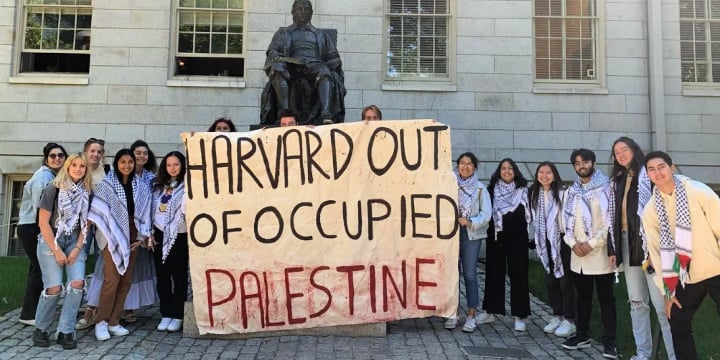The slogan ‘from the river to the sea, Palestine will be free’ has been widely used as a call for the destruction of Israel, which is located between the Jordan River and the Mediterranean Sea.
By Dion J. Pierre, The Algemeiner
Harvard University President Claudine Gay on Thursday condemned the widely used anti-Israel phrase “from the river to the sea” while elaborating on plans to combat antisemitism on campus amid outcry that the school is not doing enough to ensure the safety of Jewish students.
“Our community must understand that phrases such as ‘from the river to the sea’ bear specific historical meanings that to a great many people imply the eradication of Jews from Israel and engender both pain and existential fears within our Jewish community,” Gay said in a statement. “I condemn this phrase and any similarly hurtful phrases.”
The slogan “from the river to the sea, Palestine will be free” has been widely used as a call for the destruction of Israel, which is located between the Jordan River and the Mediterranean Sea.
Anti-Israel activists have argued that opposition to the phrase is meant to suppress free speech — an argument noted by Gay.
“I have heard concerns from some about how this important work relating to antisemitism will bear on Harvard’s vital commitment to free expression,” she said. “Combating antisemitism and fostering free expression are mutually consistent goals. We are at our strongest when we commit to open inquiry and freedom of expression as foundational values of our academic community.”
The world’s leading definition of antisemitism — penned by the International Holocaust Remembrance Alliance — considers efforts to deny Israel’s right to exist as antisemitic.
Gay’s statement came amid mounting concerns that Harvard has been allowing antisemitism to proliferate on campus under the guise of protecting free speech and expression. After Hamas’ Oct. 7 massacre across southern Israel, the university waited days to condemn the Palestinian terrorist group’s mass slaughter and rape of civilians. The administration also declined to censure 31 student groups, led by the school’s Palestine Solidarity Committee (PSC), who blamed Israel for the attack and accused the Jewish state of operating an “open air prison” in Gaza, despite the Israeli military having fully withdrawn from the territory in 2005.
Harvard’s response has angered major donors to the university. On Oct. 15, the Wexner Foundation, a prominent philanthropic organization, announced that it was terminating a longstanding partnership with the school. Other reports, first disclosed by eJewishPhilanthropy, said that Harvard alumni and other major donors, shocked by the university’s response to the Hamas atrocities, were also considering ceasing their financial support for the university.
Jewish alumni spoke out as well. Earlier this month, more than 1,200 Jewish alumni of Harvard signed a letter to the university’s president and dean demanding action to combat rising antisemitism on campus. The graduates formed the first Jewish alumni association in the history of Harvard.
In Thursday’s statement, Gay, who was appointed as Harvard’s first Black president last December, said “antisemitism has no place at Harvard” and provided additional details about a recently formed Antisemitism Advisory Group.
The group, she explained, plans to implement several reforms, including a historical examination of the roots of antisemitism at Harvard, educational programming highlighting the antisemitic origins of anti-Israel rhetoric, raising awareness of anonymous reporting of antisemitic incidents, forging relationships with external groups, and for the first time ever incorporating Holocaust Remembrance Day and Jewish American Heritage Month into the school’s calendar.
“Harvard was founded to advance human dignity through education,” Gay said. “We inherited a faith in reason to overcome ignorance, in truth to surmount hate. Antisemitism is destructive to our mission. We will not solve every disagreement, bridge every divide, heal every wound. But if we shrink from this struggle, we betray our ideals.”
Another high-level Harvard official, provost Alan Garber, has attempted to address the fallout from the controversies since Oct. 7, telling the Harvard Crimson on Thursday that the university’s first belated comments on the Hamas attack “did not succeed” in acknowledging the terrorist group’s atrocities or showing support to the campus’ Jewish community. He also added that while the administration is concerned about Islamophobia, there is “greater urgency about addressing antisemitism” because of its resurgence around the country.
The Algemeiner has reported on numerous antisemitic outrages at Harvard University. Recently, anti-Zionism there escalated to apparent antisemitic harassment when a mob of anti-Israel activists — including Ibrahim Bharmal, editor of the prestigious Harvard Law Review — followed, surrounded, and intimidated a Jewish student on campus.
“Shame! Shame! Shame! Shame!” the crush of people screamed in a call-and-response chant into the ears of the student who —as seen in widely circulated footage — was forced to duck and dash the crowd to free himself from the cluster of bodies that encircled him.
Last month, the Harvard Kennedy School received a searing legal letter calling for disciplinary measures against a professor whom it months ago determined had “denigrated” several students for being “Israelis and Jews,” according to documents shared exclusively with The Algemeiner.
Last year, the Harvard Crimson, the university’s flagship newspaper, endorsed the boycott, divestment, and sanctions (BDS) movement against Israel. In September, to start the 2022-2023 academic year, a student and anti-Israel activist interrupted a convocation ceremony held by the school, shouting at Harvard College Dean Rakesh Khurana, “Here’s the real truth — Harvard supports, upholds, and invests in Israeli apartheid, and the oppression of Palestinians!”


